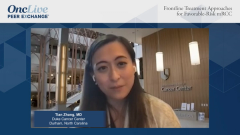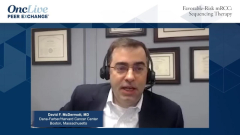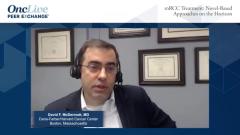
Favorable-Risk mRCC: Aggressive Therapy and Disease Progression
The rationale for treating favorable-risk metastatic renal cell carcinoma with early, aggressive therapy and considerations for approaching disease progression.
Episodes in this series

Thomas E. Hutson, DO, PharmD: What do these folks do when half their patients don’t respond to their therapy? It’s a little discouraging, especially in a favorable risk person, when I’m giving them therapy and the best response is progression. Obviously, ipilimumab-nivolumab has the highest likelihood of that of the therapies. I’d be interested to see how people attack that problem at their 3-month scan.
Sumanta Kumar Pal, MD: Dave?
David F. McDermott, MD: I say, “Sorry, we didn’t get what we wanted. We have this great treatment for you if you want it. But if your cancer is stable or not growing much, you could also hold off on the next treatment.” Many of those patients don’t need aggressive treatment if they’re not progressing rapidly. I’m not advocating that every person with good risk should get this choice. They should just hear about it and we should rationally apply it. We should try to identify the good-risk patients and all patients who can benefit from I/O [immuno-oncology] therapies and give them to those up front. Not so much based on clinical criteria, but maybe based on some understanding of their tumor. The story remains the same. We shouldn’t be giving PD-1 to everyone, but let’s give it to the right patients because, ultimately, all kidney cancer is bad risk. It’s going to end the life of your patient unless you put them into remission, so I want to give a few people a shot regardless of the IMDC [International Metastatic Renal Cell Carcinoma Database Consortium] criteria.
Thomas E. Hutson, DO, PharmD: Why don’t we all agree that none of us is firm and hard in our rules? Dave gave a little bit, so let me just push him a little more. You said that not everyone is going to be an ipilimumab-nivolumab candidate in that favorable-risk category. I would say that not everyone in my practice is going to be on a TKI [tyrosine kinase inhibitor] alone. I will use an I/O–TKI in some of them. You want to present all the options to your patient and individualize it.
TRANSCRIPT EDITED FOR CLARITY



















































